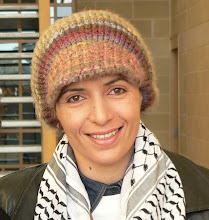By KEIJI HIRANO
Kyodo News
In July 1988, Mizue Furui was in the Gaza Strip and West Bank with her camera as a rookie freelance journalist. Mizue Furui Covering the Palestinian condition, she became acquainted with Ghada Ageel, a 23-year-old teacher at an elementary school, in November 1993 and started shooting her life up to when she turned 35.
The 12 years Furui spent shooting still and video images has borne fruit in a documentary titled "Ghada -- Songs of Palestine," which will be released in Uplink Theater in Shibuya Ward, Tokyo, in May as a rare report on women in the traditionally male-oriented Palestinian society.
The film shows Ageel becoming engaged to an engineer, resisting the holding of a traditional wedding party in a bid to break social restrictions on women and giving birth to two children.
It also shows how Palestinian women humor their children or cook even when bullets are flying above their heads.
"I want to tell through my film that ordinary people lead ordinary lives with children, but their hope for peace has not been achieved easily under the occupation," said Furui, 57.
The turning point in Ageel's life came in 2000, when the 13-year-old son of a relative was fatally shot from behind in the intifada, awakening her identity as a Palestinian.
Ageel began collecting and recording narratives and songs performed by elderly Palestinians about their lives and struggles to hand down the stories to later generations.
"Born in a refugee camp, Ghada has led all her life as a refugee, and she has become keen about her own roots since the boy's death and started working on handing down the Palestinians' experiences," Furui said. "I wanted to depict the Palestinians' lives through the eyes of Ghada in this film."
Just as Ageel has tried to overcome conventionalities in her own society, Furui grappled with hardship, in the form of articular rheumatism, when she was still an office worker at age 37.
Ghada Ageel (center) shares stories and songs with some of her Palestinian compatriots.
"I once gave up my life. But after miraculously recovering from the disease, I started taking photographs as I was seeking something to express my feelings," she said.
Her initial subjects were flowers and landscapes, but a photo exhibition in Tokyo showed her Palestinian children leading their lives energetically even under severe conditions.
"I had never turned my lens to a person until then, but the exhibition made me really want to take photos that would sway people's minds and I found myself standing in (Palestinian territory)," she said about her transformation from office worker to journalist.
Even though she was not sure if any news outlets would carry her photos and articles, she visited there frequently "as I was attracted by the Palestinian people and they warmly welcomed me."
"I was also impressed with Palestinian children, who faced fully armed soldiers with stones in the intifada," she added.
Sometimes Furui stayed with Palestinian families for several months to film their lives, particularly those of children and women.
"While I helped in their housework, the women told me their life stories and showed me dancing, making me feel like recording what they do in their own places, such as the kitchen," she said. "At that time, Ghada contributed to my coverage a lot as an interpreter."
Ageel, for her part, said in a video message to a recent Tokyo preview of the film that she has been inspired by Furui as a reporter. She is now working on compiling a book based on the histories told to her by older Palestinians.
Furui's beats now include Afghanistan, Indonesia, Bosnia-Herzegovina and Uganda, and her photos, videos and articles have been carried by major magazines, newspapers and TV news shows.
She has shot more than 500 hours of video in the Palestinian territories. She said she decided to make the film because the time constraints of reports for TV news or documentary programs prevent her from doing the kind of full reporting she would most like to do.
"They (TV news programs) sometimes give me only five minutes even after three months of coverage," she said.
Akihiro Nonaka, who leads Asia Press International, a group of freelance video journalists, said, "So far, people tend to focus mainly on the struggles of Palestinians, but we can see candid pictures of Palestinian women in this film, which have been rarely reported, as a result of Ms. Furui covering them closely."
The film, with English subtitles, was shown in Busan, South Korea, and will be shown in Hong Kong in April, according to Furui, also a member of Asia Press.
"I hope this film will be widely distributed not only domestically but overseas so more and more people will feel close to the Palestinian issue, although they live in a rather (distant) area," Furui said.
Ageel is expected to join Furui in Japan when the film is shown to the general public.
http://search.japantimes.co.jp/cgi-bin/nn20060308f1.html
Wednesday, 8 March 2006
Subscribe to:
Comments (Atom)
Palestinian refugees sit at Khan Younis refugee camp


